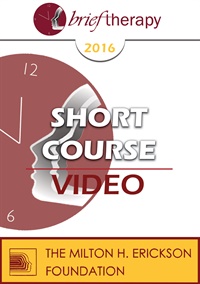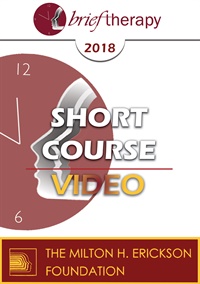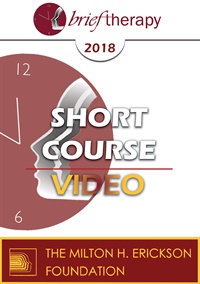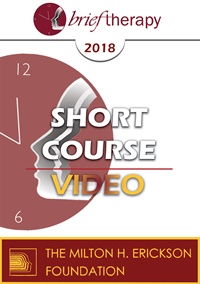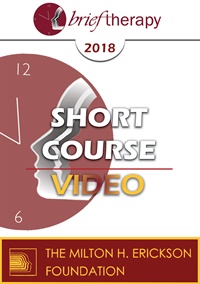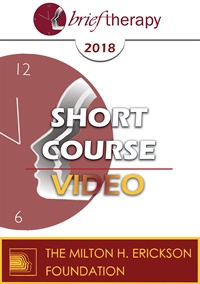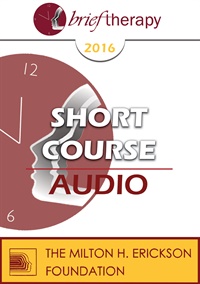
- Average Rating:
- Not yet rated
- Topic Areas:
- Short Courses | Bipolar | Utilization | Art and Creativity | Brief Therapy | Personality Disorders
- Categories:
- Brief Therapy Conference | Brief Therapy Conference 2016
- Faculty:
- Suzanne Black, PsyD
- Duration:
- 1:30:51
- Format:
- Audio Only
- Original Program Date:
- Dec 08, 2016
- Short Description:
- This session will cover defining and treating the complexity of Bipolar Affective Spectrum Disorder. Particular attention will be paid to common misconceptions about the psychiatric condition, how clinicians can become stuck in their treatment approaches, and how creative, brief therapy interventions, including the use of Ericksonian hypnosis, can be utilized to assist in obtaining treatment goals. Using the latest findings in neuroscience, this session will present effective and successful methods to manage and resolve treatment challenges in dealing with this highly misunderstood diagnosis/ psychiatric condition.
- Price:
- $15.00 - Base Price
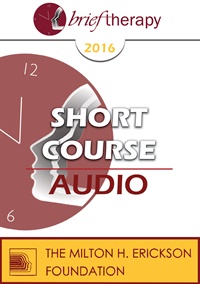
- Average Rating:
- Not yet rated
- Topic Areas:
- Hypnosis | Short Courses | Utilization | Brief Therapy | Ericksonian Hypnosis and Therapy Techniques | Self-Hypnosis
- Categories:
- Brief Therapy Conference | Brief Therapy Conference 2016
- Faculty:
- Jeffrey Feldman, PhD
- Duration:
- 1:21:10
- Format:
- Audio Only
- Original Program Date:
- Dec 08, 2016
- Short Description:
- This short course will introduce two self-hypnotic techniques. The first builds upon the “heart lock in” technique of Hearthmath. The second transforms psychomotor agitation to a self-soothing rhythmic brain input that enables individuals to “get in touch with the wealth of life experience at their fingertips”.
- Price:
- $15.00 - Base Price
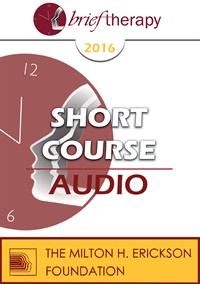
- Average Rating:
- Not yet rated
- Topic Areas:
- Short Courses | Brief Therapy | Children and Adolescent Therapy | Hypnotic Induction | Psychotherapy
- Categories:
- Brief Therapy Conference | Brief Therapy Conference 2016
- Faculty:
- Bette Freedson, MSW
- Duration:
- 1:30:02
- Format:
- Audio Only
- Original Program Date:
- Dec 08, 2016
- Short Description:
- This workshop presents the SOLVE method, a brief 5-step approach to psychotherapy with young clients that effectively orients toward decreased anxiety, increase in number of positive cognitions, enhanced problem solving and enduring behavioral changes. Participants will explore and experience how induction, visualization and didactics empower lasting behavioral and emotional improvement.
- Price:
- $15.00 - Base Price
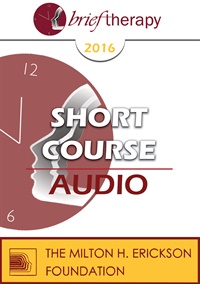
- Average Rating:
- Not yet rated
- Topic Areas:
- Short Courses | Brief Therapy | Neuroscience
- Categories:
- Brief Therapy Conference | Brief Therapy Conference 2016
- Faculty:
- James Rini
- Duration:
- 1:27:43
- Format:
- Audio Only
- Original Program Date:
- Dec 08, 2016
- Short Description:
- Rapid Interpersonal Neural Integration packages the essential elements from the works of Milton Erickson, Fritz Perls, Virginia Satir, Jeffrey Zeig, and Ernest Rossi to facilitate lasting change through rapid neural integration. The mindsets and blind-spots identified through the interview process and observations guide the therapist as to how the mindsets and blind-spots need to be refined. The therapist then helps the client transform the flow of energy and information away from blockages and distortions by addressing the fear(s) underlying and feeding the mindsets and blind-spots.
- Price:
- $15.00 - Base Price
Tags: Brief Therapy Neuroscience
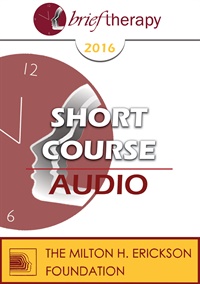
- Average Rating:
- Not yet rated
- Topic Areas:
- Short Courses | Brief Therapy | Communication | Relationships | Therapeutic Relationship | Humor
- Categories:
- Brief Therapy Conference | Brief Therapy Conference 2016
- Faculty:
- John Lentz, D. Min.
- Duration:
- 1:40:07
- Format:
- Audio Only
- Original Program Date:
- Dec 08, 2016
- Short Description:
- One liners that change people is the epitome of brief therapy. All of us have had times when one thing was said at the right moment by the right person and suddenly the world was seen differently. This workshop invites you to recognize elements that make those magic moments possible.
- Price:
- $15.00 - Base Price
- Average Rating:
- Not yet rated
- Topic Areas:
- Short Courses | Mindfulness | Habits | Brief Therapy | Psychotherapy
- Bundle(s):
- Learning Track - Mindfulness
- Categories:
- Brief Therapy Conference | Brief Therapy Conference 2016
- Faculty:
- Lawrence Peltz, MD
- Course Levels:
- Master Degree or Higher in Health-Related Field
- Duration:
- 1:30:12
- Format:
- Audio and Video
- Original Program Date:
- Dec 08, 2016
- Short Description:
- We all have habits, from seemingly harmless to life threatening. But how do they work? And what makes them so resistant to change? This workshop presents a simple model of four categories of experience—the benefits and costs of maintaining v. relinquishing a habit. This brief approach emphasizes mindfulness practice and works well with other psychotherapeutic methods.
- Price:
-
Sale is $29.00
price reduced from Base Price - $59.00
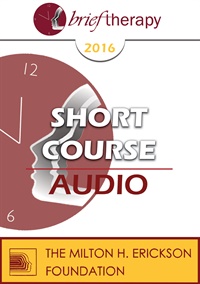
- Average Rating:
- Not yet rated
- Topic Areas:
- Short Courses | Brief Therapy | Community | Multicultural | Therapist Development
- Categories:
- Brief Therapy Conference | Brief Therapy Conference 2016
- Faculty:
- Karin Schlanger, MFT | Gloria Diaz Arnal, MFT Intern
- Duration:
- 1:11:09
- Format:
- Audio Only
- Original Program Date:
- Dec 08, 2016
- Short Description:
- Palo Alto Brief Therapy model applied in an educational context. Focus on advantages of using this approach when the context is a challenge in itself. The presenters – Ms. Schlanger is the heir to the MRI-Brief Therapy model, will bring examples illustrating a useful model when working with a diverse community.
- Price:
- $15.00 - Base Price
Credit available - Click Here for more information
- Average Rating:
- Not yet rated
- Topic Areas:
- Short Courses | Brief Therapy | Trauma | Ericksonian Hypnosis and Therapy Techniques | Mindfulness | Pain and Healing | Somatic Experiences
- Categories:
- Brief Therapy Conference | Brief Therapy Conference 2018 | Online Continuing Education
- Faculty:
- Ronald Alexander, PhD
- Course Levels:
- Master Degree or Higher in Health-Related Field
- Duration:
- 1:31:13
- Format:
- Audio and Video
- Original Program Date:
- Dec 06, 2018
- Short Description:
- This course focuses on helping clients regain momentum after overwhelming experiences by using brief, body-centered interventions. Participants explore how curiosity, movement, and simple awareness practices can loosen rigid trauma responses and reopen access to choice. With an emphasis on resilience-building, the session offers straightforward tools for shifting clients out of collapse and back into a sense of possibility.
- Price:
-
Sale is $29.00
price reduced from Base Price - $59.00
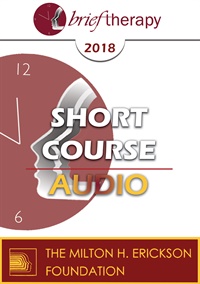
- Average Rating:
- Not yet rated
- Topic Areas:
- Short Courses | Addiction | Brief Therapy | Rational Emotive Behavior Therapy (REBT) | Solution Oriented Approach
- Categories:
- Brief Therapy Conference | Brief Therapy Conference 2018
- Faculty:
- JULIA ALPEROVICH, MS
- Duration:
- 1:25:51
- Format:
- Audio Only
- Original Program Date:
- Dec 06, 2018
- Short Description:
- This presentation will introduce a short-term model of treatment incorporating solution-focused, rational emotive behavioral, and systems theory interventions for residential or intensive outpatient drug and alcohol treatment.
- Price:
- $15.00 - Base Price
Credit available - Click Here for more information
- Average Rating:
- Not yet rated
- Topic Areas:
- Short Courses | Children and Adolescent Therapy | Cognitive Behavior Therapy (CBT) | Hypnosis
- Categories:
- Brief Therapy Conference | Brief Therapy Conference 2018 | Online Continuing Education
- Faculty:
- Jeffrey Lazarus, MD, FAAP
- Course Levels:
- Master Degree or Higher in Health-Related Field
- Duration:
- 1:09:51
- Format:
- Audio and Video
- Original Program Date:
- Dec 06, 2018
- Short Description:
- David Burns, MD, has developed TEAM therapy (Testing, Empathy, Agenda Setting, and Methods), using new tools, including new forms of communication skills that can be applied to any type of therapy (CBT, psychodynamic, hypnosis, etc.), enhancing results and speeding up the process. This is the first time the same model that Dr. Burns has been using and teaching for adults will be shown in working with children and adolescents.
- Price:
-
Sale is $29.00
price reduced from Base Price - $59.00
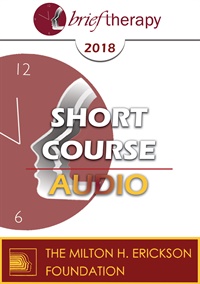
- Average Rating:
- Not yet rated
- Topic Areas:
- Short Courses | Brief Therapy | Therapist Development
- Categories:
- Brief Therapy Conference | Brief Therapy Conference 2018
- Faculty:
- Flavio Cannistra'
- Duration:
- 1:07:49
- Format:
- Audio Only
- Original Program Date:
- Dec 06, 2018
- Short Description:
- Hundreds of brief therapy techniques exist. In this presentation, I will identify the 9 underlying logics, together with methodology and examples.
- Price:
- $15.00 - Base Price
- Average Rating:
- Not yet rated
- Topic Areas:
- Short Courses | Hypnotherapy | Somatic Experiences | Trauma | Children and Adolescent Therapy | Brief Therapy
- Categories:
- Brief Therapy Conference | Brief Therapy Conference 2018
- Faculty:
- Tobi Goldfus, LCSW
- Course Levels:
- Master Degree or Higher in Health-Related Field
- Duration:
- 1:09:59
- Format:
- Audio and Video
- Original Program Date:
- Dec 06, 2018
- Short Description:
- This workshop will examine the perimeters of cyber trust and cyber sincerity and offer assessment tools such as the Social Media Assessment Form and the Self-Report of Social Media Traumatic Experience Form to move into more informed, attuned and effective positions of intervention.
- Price:
-
Sale is $29.00
price reduced from Base Price - $59.00
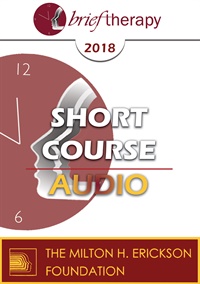
- Average Rating:
- Not yet rated
- Topic Areas:
- Short Courses | Depression | Eating Disorders | Brief Therapy | Hypnotherapy | Weight Loss
- Categories:
- Brief Therapy Conference | Brief Therapy Conference 2018
- Faculty:
- Margot Gotte-El Fartoukh, Dr. phil
- Duration:
- 1:26:23
- Format:
- Audio Only
- Original Program Date:
- Dec 06, 2018
- Short Description:
- The control of body weight is largely remote instinctively. When conscious efforts go nowhere, hypnotherapeutic strategies can open new possibilities. Presented is a model of hypnotherapeutic strategies of weight regulation introduced on the M.E.G. Congress 2018 in Bad Kissingen (Germany).
- Price:
- $15.00 - Base Price
Credit available - Click Here for more information
- Average Rating:
- Not yet rated
- Topic Areas:
- Short Courses | Brief Therapy | Belief Systems | Pain and Healing
- Categories:
- Brief Therapy Conference | Brief Therapy Conference 2018 | Online Continuing Education
- Faculty:
- Timothy Hallbom, MSW | Kris Hallbom, BA
- Course Levels:
- Master Degree or Higher in Health-Related Field
- Duration:
- 1:17:03
- Format:
- Audio and Video
- Original Program Date:
- Dec 06, 2018
- Short Description:
- Dynamic Spin Release™ is a powerful set of processes that allows users to quickly release their negative thought patterns and emotions, limiting beliefs and physical pain – in just one brief session.
- Price:
-
Sale is $29.00
price reduced from Base Price - $59.00
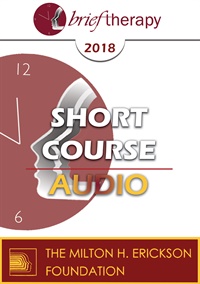
- Average Rating:
- Not yet rated
- Topic Areas:
- Short Courses | Brief Therapy | Psychotherapy
- Categories:
- Brief Therapy Conference | Brief Therapy Conference 2018
- Faculty:
- Melanie McGhee, LCSW
- Duration:
- 1:28:08
- Format:
- Audio Only
- Original Program Date:
- Dec 06, 2018
- Short Description:
- After a brief exploration of the six principles of Acceptance and Integration Training, participants will learn a simple method for helping clients recognize distorted thoughts AS distorted.
- Price:
- $15.00 - Base Price
Tags: Brief Therapy Psychotherapy
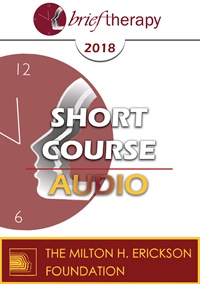
- Average Rating:
- Not yet rated
- Topic Areas:
- Short Courses | Dreamwork | Psychotherapy | Brief Therapy | Consciousness
- Categories:
- Brief Therapy Conference | Brief Therapy Conference 2018
- Faculty:
- Bruce Fordham, MA/CMHC
- Duration:
- 1:25:38
- Format:
- Audio Only
- Original Program Date:
- Dec 06, 2018
- Short Description:
- This workshop will provide a basic understanding of how to utilize dreamwork in psychotherapy, thereby providing an excellent alternative for patient care - especially when a patient's defenses are strong.
- Price:
- $15.00 - Base Price
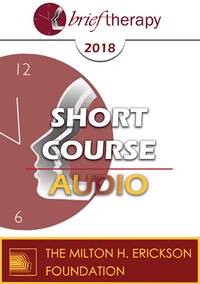
- Average Rating:
- Not yet rated
- Topic Areas:
- Short Courses | Anxiety | Depression | Self-Hypnosis | Somatic Experiences | Burnout | Psychosomatics | Self-Esteem | Stress
- Categories:
- Brief Therapy Conference | Brief Therapy Conference 2018
- Faculty:
- Paul Koeck, MD
- Duration:
- 1:33:40
- Format:
- Audio Only
- Original Program Date:
- Dec 06, 2018
- Short Description:
- This is a workshop with live Hypnotic Scaling clinical demonstration and practical exercises. Hypnotic Scaling is a simple Ericksonian & Solution Focused self-hypnotic technique to help your client self-control and resolve any Stress, Anxiety, Depression or other negative emotions.
- Price:
- $15.00 - Base Price
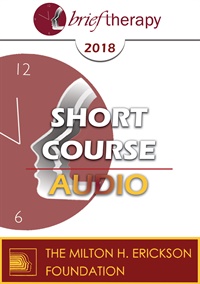
- Average Rating:
- Not yet rated
- Topic Areas:
- Short Courses | Brief Therapy | Art and Creativity | Psychotherapy | Solution Oriented Approach
- Categories:
- Brief Therapy Conference | Brief Therapy Conference 2018
- Faculty:
- George Ferrick, MA
- Duration:
- 1:24:31
- Format:
- Audio Only
- Original Program Date:
- Dec 06, 2018
- Short Description:
- This workshop will describe strategies and approaches adapted from brief and solution focused therapy. These enhanced mediation with creative ways to set a tone and reduce anxiety and resistance; to give voice to participants while getting to the heart of the matter; to unlock narrow positions, break through impasses, move to broader viewpoints, and co-create solutions.
- Price:
- $15.00 - Base Price
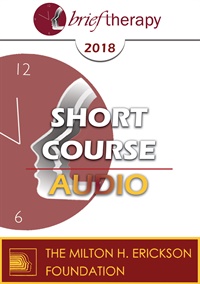
- Average Rating:
- Not yet rated
- Topic Areas:
- Short Courses | Anxiety | Brief Therapy | Utilization | Ericksonian Hypnosis and Therapy Techniques | Experiential Therapy
- Categories:
- Brief Therapy Conference | Brief Therapy Conference 2018
- Faculty:
- Wei-Kai Hung, M.Ed., L.M.H.C., L.P.C.
- Duration:
- 1:25:01
- Format:
- Audio Only
- Original Program Date:
- Dec 06, 2018
- Short Description:
- Alchemy is about transformation process (Linear). Taoism is about going with flow (Circular). Ericksonian is about utilization and experiential therapy (Infinite Possibilities). This experiential workshop will utilize the best of eastern and western philosophical concepts to treat anxiety effectively and efficiently.
- Price:
- $15.00 - Base Price
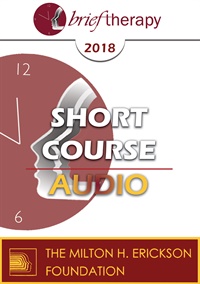
- Average Rating:
- Not yet rated
- Topic Areas:
- Short Courses | Anxiety | Brief Therapy | Family Therapy
- Categories:
- Brief Therapy Conference | Brief Therapy Conference 2018
- Faculty:
- Dhara Meghani, PhD | Paulina Barahona, MS
- Duration:
- 1:25:43
- Format:
- Audio Only
- Original Program Date:
- Dec 06, 2018
- Short Description:
- Parentline is a telehealth service developed by psychologists at University of San Francisco for families with children birth to three. Presenters will detail this protocol and its integration with the delivery of focused, skill-based interventions, which research indicates is especially supportive for new parents. Pilot study results of the protocol, which is hypothesized to increase parenting confidence, decrease anxiety and depressive symptoms, and improve perceptions of support in the first six months postpartum, will be shared.
- Price:
- $15.00 - Base Price
Credit available - Click Here for more information
- Average Rating:
- Not yet rated
- Topic Areas:
- Short Courses | Priming | Brief Therapy | Resistance
- Categories:
- Brief Therapy Conference | Brief Therapy Conference 2018 | Online Continuing Education
- Faculty:
- Clifton Mitchell, PhD
- Course Levels:
- Master Degree or Higher in Health-Related Field
- Duration:
- 1:28:19
- Format:
- Audio and Video
- Original Program Date:
- Dec 06, 2018
- Short Description:
- This presentation will introduce participants to the concept of priming, review selected research, and demonstrate its implications in resolving therapeutic roadblocks and creating therapeutic movement. Implications relative to the management of resistance will be a predominant theme.
- Price:
-
Sale is $29.00
price reduced from Base Price - $59.00
Credit available - Click Here for more information
- Average Rating:
- Not yet rated
- Topic Areas:
- Short Courses | Brief Therapy | Children and Adolescent Therapy
- Categories:
- Brief Therapy Conference | Brief Therapy Conference 2018 | Online Continuing Education
- Faculty:
- Susan Pinco, PhD
- Course Levels:
- Master Degree or Higher in Health-Related Field
- Duration:
- 1:31:28
- Format:
- Audio and Video
- Original Program Date:
- Dec 06, 2018
- Short Description:
- Brainspotting is a powerful tool that allows you to circumvent many of the frustrating and challenging issues that frequently impede efforts to help children, teens and adults. By engaging your clients in this active and creative process, Brainspotting allows the counselor and client to work together to amplify the client’s innate ability to heal, grow and change, often with astounding speed.
- Price:
-
Sale is $29.00
price reduced from Base Price - $59.00
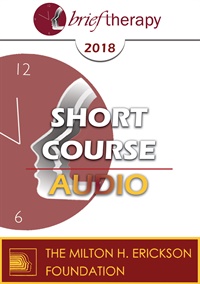
- Average Rating:
- Not yet rated
- Topic Areas:
- Short Courses | Communication | Multicultural | Sex and Sexuality | Brief Therapy
- Categories:
- Brief Therapy Conference | Brief Therapy Conference 2018
- Faculty:
- Mitra Rashidian, PhD
- Duration:
- 1:30:26
- Format:
- Audio Only
- Original Program Date:
- Dec 06, 2018
- Short Description:
- In this workshop, clinicians’ level of comfort, barriers, and attitudes when talking about sexuality will be highlighted, along with useful strategies to provide better engagement with their clients. Additional strategies used to build upon a person’s individual strengths to assist them in overcoming cultural and personal sexual imprints are offered.
- Price:
- $15.00 - Base Price
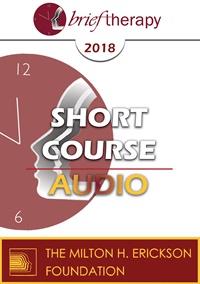
- Average Rating:
- Not yet rated
- Topic Areas:
- Short Courses | Brief Therapy | Family Therapy | Resistance
- Categories:
- Brief Therapy Conference | Brief Therapy Conference 2018
- Faculty:
- Mercedes Samudio, LCSW
- Duration:
- 1:30:44
- Format:
- Audio Only
- Original Program Date:
- Dec 06, 2018
- Short Description:
- In this training, the presenter will focus on what it means to work effectively with resistant parents and keep them engaged during the therapeutic process. We’ll explore the role a parent plays in a family’s ability to change, successfully maintain those changes, and what strategies clinicians can use to bypass parental resistance to develop a therapeutic alliance that empowers parents and heals families.
- Price:
- $15.00 - Base Price
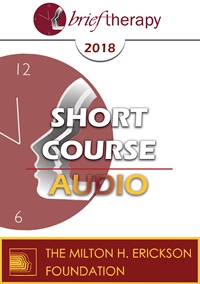
- Average Rating:
- Not yet rated
- Topic Areas:
- Short Courses | Humor | Psychotherapy | Brief Therapy | Relationships
- Categories:
- Brief Therapy Conference | Brief Therapy Conference 2018
- Faculty:
- Steven Sultanoff, Psychologist
- Duration:
- 1:18:02
- Format:
- Audio Only
- Original Program Date:
- Dec 06, 2018
- Short Description:
- Integrating therapeutic humor into psychotherapy is more than simply using humor with clients. This presentation will explore how and why integrating humor into clinical practice can be effective as well as assist clinicians to use humor with clinical awareness. Participants will learn a model of clinical humor that provides a foundation for the use of humor in psychotherapy and discover how humor (when purposely chosen as a clinical intervention) can be used as a relationship enhancing intervention, as well as a diagnostic and treatment tool.
- Price:
- $15.00 - Base Price


